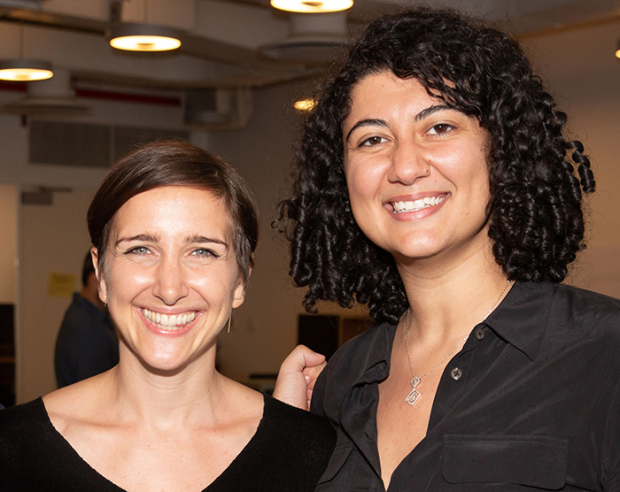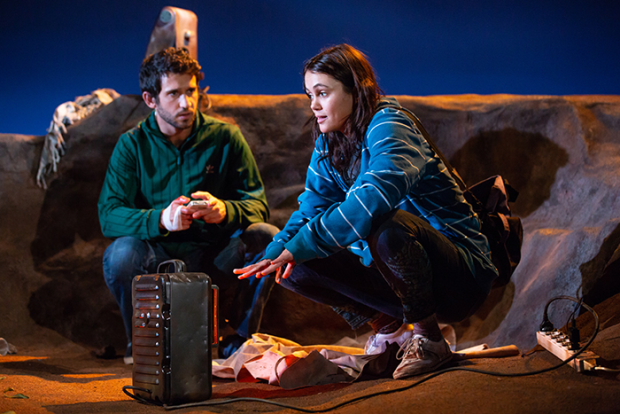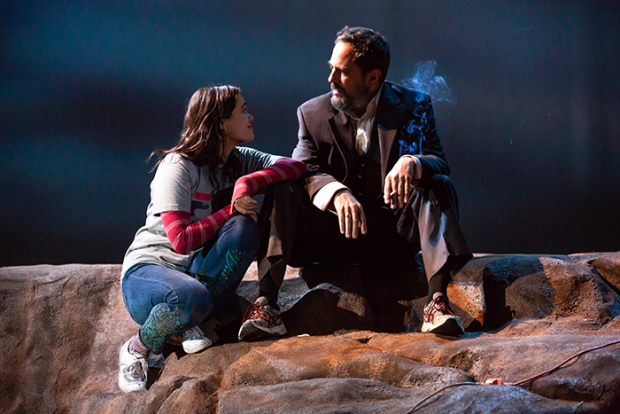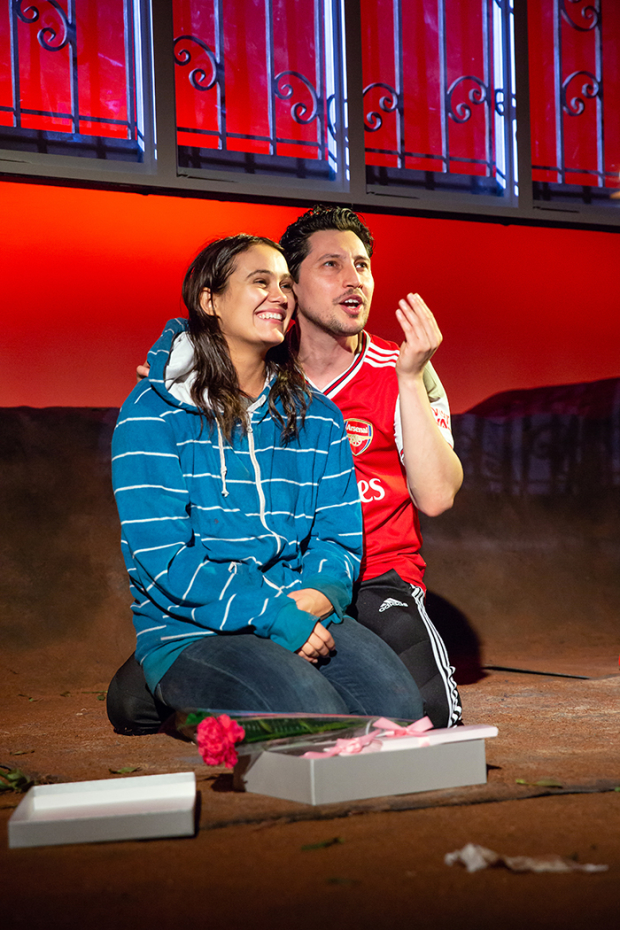Sylvia Khoury and Tyne Rafaeli Make Global Trauma Personal in Power Strip
Khoury’s latest play at LCT3 pits freedom against survival.
Calling Sylvia Khoury busy is an understatement. The fourth-year medical student is also a playwright with two productions opening during the 2019-20 season. Both works tackle hard-hitting political topics, exploring them through deeply personal stories. Selling Kabul, which premiered at Williamstown Theatre Festival, tells the story of an interpreter for the US military in Afghanistan, hiding from the Taliban with the help of his family. And Power Strip, which follows Yasmin, a young woman determined to escape a Greek refugee camp, explores what Khoury describes as "the paradox of being an Arab woman."
But she's not doing it alone. Power Strip, which opened October 21 at Lincoln Center's Claire Tow Theater starring Dina Shihabi as Yasmin, marks the second collaboration of Khoury and director Tyne Rafaeli. The two were inspired to dramatize accounts of sexual assault in Syria and the ways in which those attacks were utilized to sever the ties of accepted social customs. Khoury, whose family is from the Middle East, is familiar with what she describes as the "impossible expectations put on women" and believed it was important to "render them onstage."
Before rendering, they researched. The two conducted interviews and devoured first-person accounts from the Syrian Civil War. They also referenced the books The Morning They Came for Us: Dispatches From Syria, We Crossed a Bridge and It Trembled: Voices From Syria, and Nine Parts of Desire: The Hidden World of Islamic Women, an exploration of sexual desire in the Arab world. And then they somehow integrated all of this research into a single 90-minute play.

(© Jeremy Daniel)
This conversation has been condensed and edited for clarity.
We first meet Yasmin in the camps, where she is determined to survive at all costs. The flashbacks to her earlier life show how much the war has changed her. How do you convey that evolution, specifically the ways in which it alters Yasmin's ideas about her own femininity?
Sylvia Khoury: I think the context from which she came, she was valued for those feminine qualities and lifted up and praised for being demure and taking care of the men around her. Because of her rape and the trauma of being displaced, she finds the only way to survive, which is to embody something that we don't consider feminine. She has to turn everything on its head and live in a way completely antithetical to the way she was raised to be.
Tyne Rafaeli: Dina and I talked a lot about how [trauma] affects her body and her voice and her behavior. She goes from an oppressive dynamic in which she has been socialized to think she needs to be protected, to a place in which her survival is dependent only on herself. She kind of goes from one end of the spectrum to the other. I think where she finds herself at the end is searching or reaching towards a true freedom. I'm not sure where we find her at the beginning of the play is a true freedom. I think it's protection. But what is it for a woman to live free, as opposed to in defense of oneself – in pursuit of something, as opposed to in reaction to something? That is really the journey of her through the play.

(© Jeremy Daniel)
How difficult was it to capture the nuances of this political environment?
Tyne: There is a code inside that culture [of Syria] that we have really worked hard to try to understand, but we're also very humble and aware that we'll never truly understand it. In the acting and storytelling – what is the psychology that is formed living under that kind of regime, and what is the psychology that is then formed living in a displaced purgatory? It was very, very important to us that it was a dangerous world, but not a bleak world. That these people have hopes and complexities and desires as any of us.
This production is your second collaboration. How do you two work together?
Sylvia: The heart of our collaboration is a spirit of openness and approaching the rehearsal room understanding we're going to mine everyone's experiences and thoughts about the world and they're going to be integrated into this play. It's amazing when I watch the play now, you really feel all the strands of the different people who have touched it.

(© Jeremy Daniel)
Your productions have been quite political. Do you think artists have a responsibility to create politically driven work?
Tyne: The thing I love about Sylvia's work is it's deeply, deeply personal and operates from an emotional place — a place about relationships and ultimately about love, set within incredibly ambitious global political contexts. It sounds very cliched, but we approach the political in our work through the personal. We do a sh*t ton of research in order to earn the right to be in the room, and then once we're in the room, what we're mostly talking about is the relationships between people.
Sylvia: Something about working with Tyne that I really appreciate is an approach to theater that's really rigorous. It's not afraid to be political and go after deep philosophical ideas, knowing that we have to hold ourselves to a high standard to be able to make theater about these things. She really sets the tone in the room that we all are stepping into that responsibility together.
Tyne: We take very seriously the idea of telling stories inside these political and cultural contexts. We're both from very international backgrounds. Neither of us has a center of the world. We both think kind of globally.
How do your international backgrounds shape your perspectives on theater in New York?
Sylvia: The fact is we're in New York, and this is the center of the world. What people think in New York affects what happens in Afghanistan. Policy makers and other very influential people are here and I would hope they come to theater. Being here in the US, when you've been to places like Beirut where they talk about what's happening in New York and Washington and how it affects them personally, you understand there's a responsibility to make art here — to discuss things.
Tyne: I was born in England. I'm half American. I think we're really committed to making theater in this country using the kind of complexity and color of our very complicated cultural backgrounds. We talk about this all the time. There are no answers. There are only conversations, which we are committed to. What is it to tell the stories of these people? To try to access the code of this culture while making it impactful and universal for an American audience? We are deeply invested in that conversation.

(© Jeremy Daniel)










